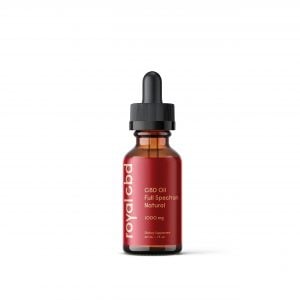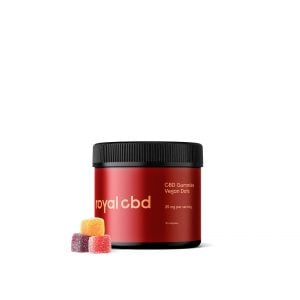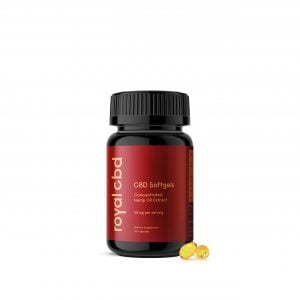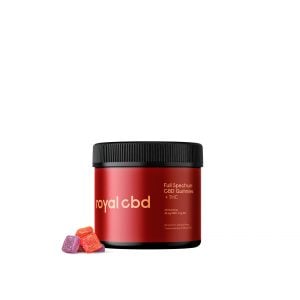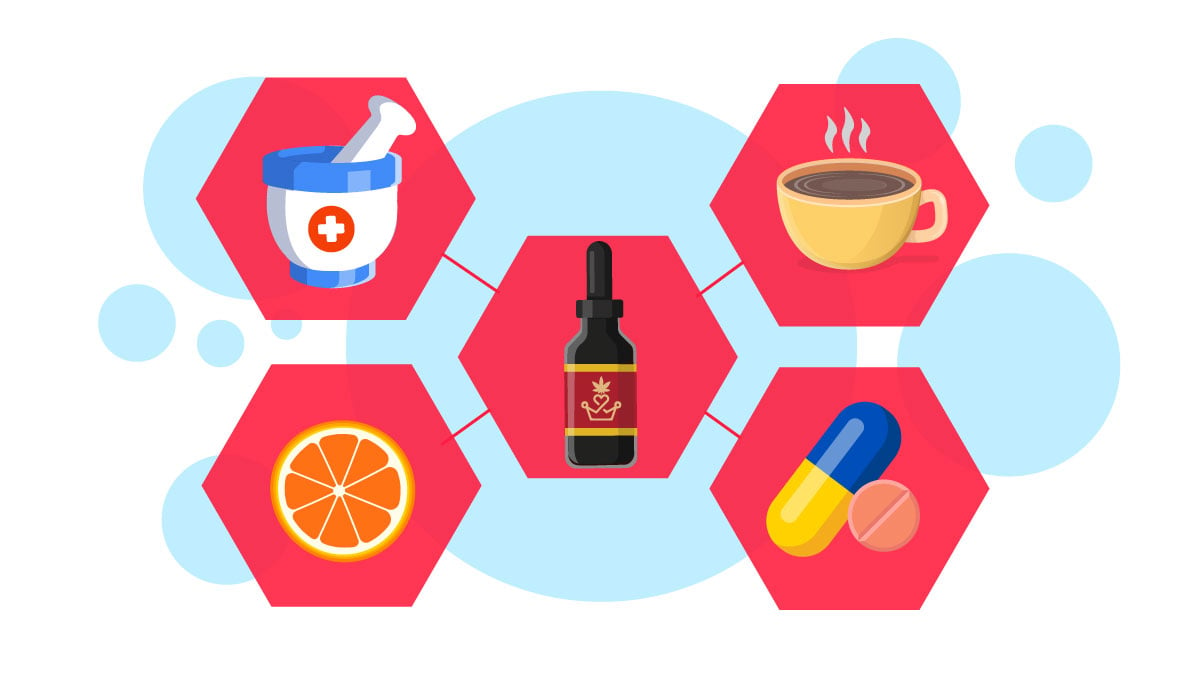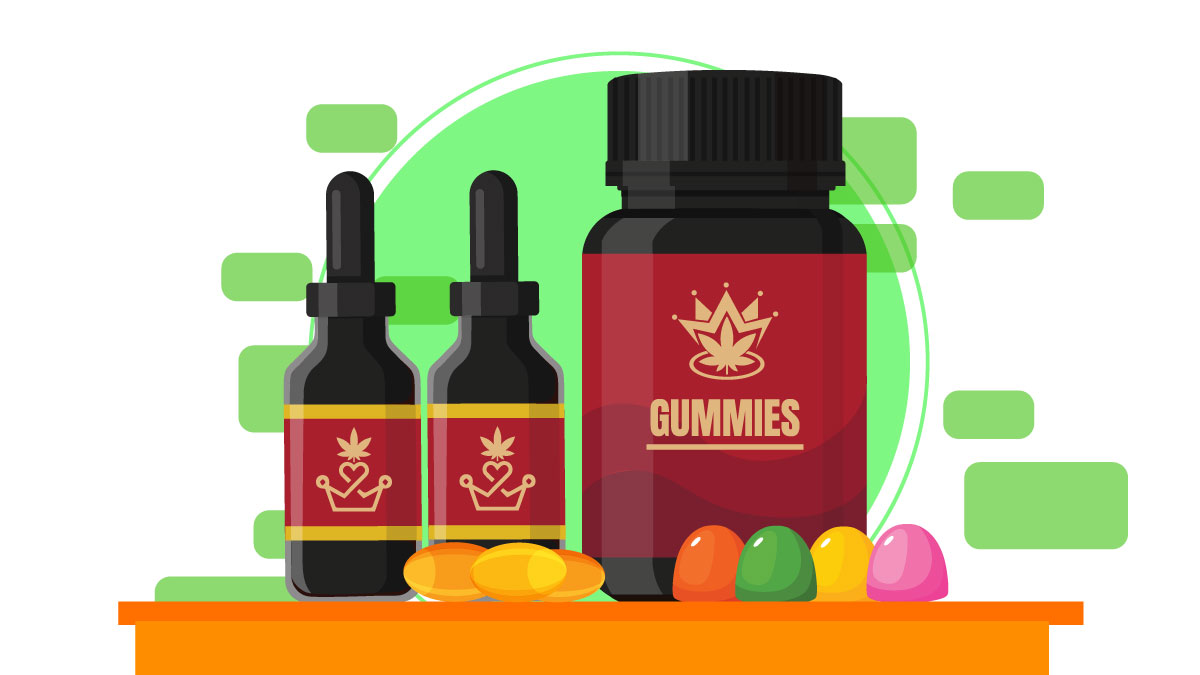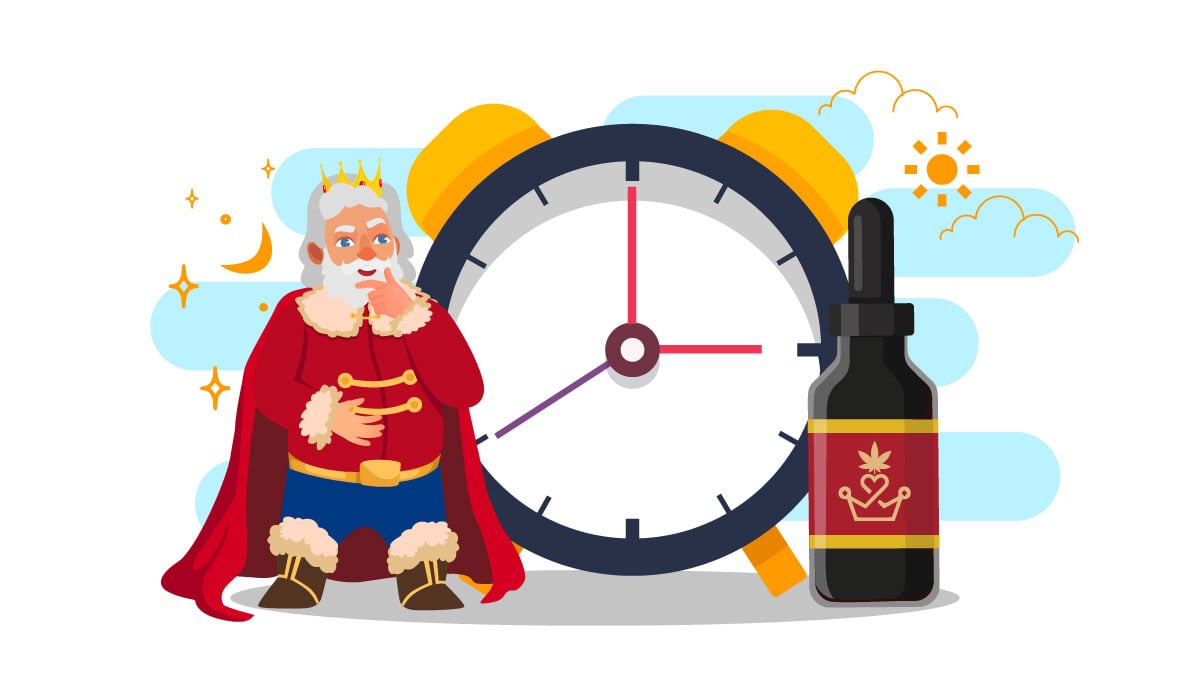Medications and supplements are known for their ability to interact inside your body with one another if you take them at the same time, so possible CBD interactions are no news.
When you speak to your doctor about treating your condition, they will pointedly ask what medications you’re currently on. That doesn’t mean doctors are nosy parkers; they just need to know that to abide by the first principle of all physicians — first, do no harm.
The source of CBD, cannabis, has a long record of medicinal use among nearly every culture that fueled civilizational progress. Its use dates back 10,000 years ago. CBD is one of the two major compounds that are responsible for potential therapeutic applications of cannabis-based products.
As a health supplement, however, CBD oil is fairly new to the market.
Therefore, your concern about CBD interactions with drugs and the risk associated with them is natural and completely understandable.
This article will explain this subject leaving no stone unturned. We’ll also highlight the medications that shouldn’t be taken with CBD due to the above interactions.
CBD and Drug Interactions: Everything You Need to Know
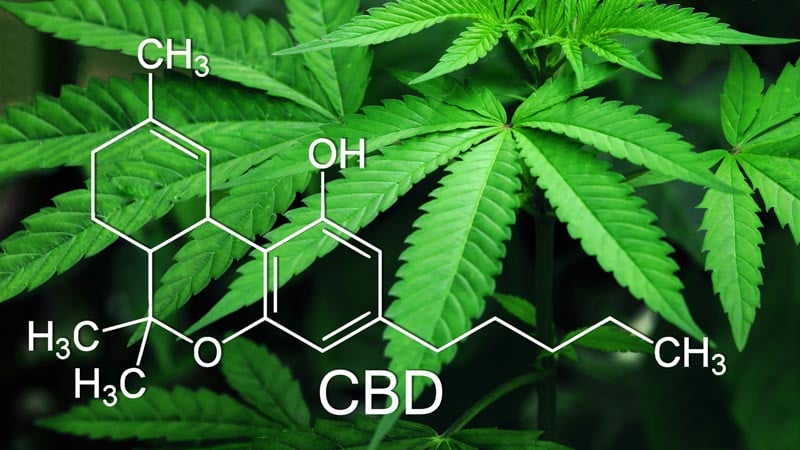
CBD (cannabidiol) is one of the 100+ cannabinoids that are secreted in the resinous parts of cannabis plants.
CBD has taken the world of modern science by the storm due to its wide range of potential therapeutic applications. Research shows that CBD may be able to help people manage a host of symptoms effectively but without the dangerous side effects associated with conventional treatments.
Moreover, unlike THC – the other most abundant cannabinoid in cannabis — CBD is non-intoxicating and won’t produce a psychoactive high associated with using marijuana.
In fact, most CBD oils on the market are made from hemp plants, which contain 0.3% of THC or less. Royal CBD products are legal and won’t make you feel high or stoned.
CBD oil is most widely known for its ability to alleviate symptoms like seizures, anxiety, psychosis, inflammation, addiction withdrawals, pain, and skin problems. Studies have shown that CBD can also trigger cancer cell death in certain types of malignant tumors.
People also use CBD products as preventive supplements to help the body maintain homeostasis (biological balance) through its endocannabinoid system, which is the prime regulatory network in all vertebrae mammals.
CBD is a Safe Substance on Its Own
The majority of scientific research indicates CBD oil is safe to use on its own. However, it’s also a very powerful compound that can engage with a variety of systems within the body, including the one responsible for processing the active ingredients in medications.
Let’s find out why CBD can become less benign when taken together with other substances such as prescription drugs.
Understanding the Metabolism of CBD and Medications
Before we investigate the impact of CBD on medications, we must dive deeper into the mechanism behind their processing. In the next section, you’ll learn what systems are involved in metabolizing CBD and how this cannabinoid affects something known as Cytochrome P-450.
What is Metabolism?

What comes to your mind when you say “metabolism?”
Most people associate metabolism with how fast or slow they gain and lose weight. This type of metabolism has its scientific definition: the basal metabolic rate. It defines the number of calories a person requires in order to function properly while at rest.
However, basal metabolic rate and metabolism are two different terms.
Metabolism refers to the way in which active ingredients from food, supplements, and medications are processed and used by the body. The vast majority of metabolic processes happen in the gut and the liver.
When you take CBD edibles or capsules, they go through something known as the “first pass effect.”
In simple terms, when you eat food, the liver breaks it down into its individual compounds so the body can use it efficiently.
For example, proteins are broken into amino acids, fats into triglycerides, and carbohydrates into sugars. From there, enzymes break these compounds into metabolites that can then be used by the body, as in regeneration processes, the formation of the new cells, or as a fuel for your body.
The above applies to drug metabolism as well. Drug metabolism refers to the rate at which supplements and medications are broken down by the liver and how long they stay in one’s system.
So, how does a typical route of CBD transportation look like?
When you swallow an oral form of CBD, it has to pass through the digestive system where it gets metabolized first; then, it enters the bloodstream through the hepatic portal. Once there, the liver breaks CBD down into its metabolites by enzymes, allowing for further circulation of the compound throughout the body.
The Cytochrome 450 System: How CBD and Medications Are Metabolized
Aside from breaking compounds down into metabolites, the liver also detoxifies and helps the body get rid of foreign drugs and other types of toxic substances. It does it through a mechanism known as the cytochrome P450 system, which is made of a special class of enzymes using heme to turn fat-soluble compounds into more water-soluble compounds to help the body absorb them more efficiently.
The Cytochrome 450 is responsible for processing over 60% of any foreign substance that people consume. Doctors use this system to estimate drug dosages for patients and to predict their effects as well as potential adverse reactions.
There are certain substances that can disturb the way the Cytochrome P450 system processes medications, causing them to metabolize at a slower or faster rate than normal.
CBD is one of those substances.
How CBD Interacts with the Cytochrome P450 System
CBD can affect the Cytochrome 450 system directly in the liver. According to preclinical studies, the mechanism through which CBD acts on this system is by binding to the site of the enzymatic activity. This way, CBD becomes a “competitive inhibitor”, preventing the Cytochrome p450 from breaking down other compounds.
The strength of this inhibitory effect on the cytochrome p450 depends on the amount of CBD ingested as well as the unique physiology of the user and the type of CBD product. These factors determine how tightly the CBD molecules will block the active site of the metabolic enzyme. Higher concentrations of CBD tend to result in more competitive blockage.
Translating to plain English, CBD competes with other medications when taken together, usually being metabolized first. This means that CBD can deactivate the effects of all medications that pass through the Cytochrome p450 system.
If you take low doses of CBD, it will have very little to no noticeable effect on how medications are metabolized. On the other hand, larger doses of CBD will bind to a greater area of enzyme activity and prevent a significant amount of the other medicine from being metabolized.
Why It’s Important to Watch Out for CBD Interactions
When the Cytochrome p450 system is affected by CBD, it changes the way your liver processes a lot of drugs. In simple terms, they won’t be metabolized as efficiently as they would have been without CBD. This comes with two serious side-effects. First, your medication will lose efficacy; second, this situation can lead to higher levels of other compounds to remain in the body at a time.
This, in turn, may result in a range of second-hand adverse reactions like a suppressed immune system, risk of bleeding, or worse — lead to an overdose.
CBD Interactions – What Drugs Should Not Be Taken With CBD?
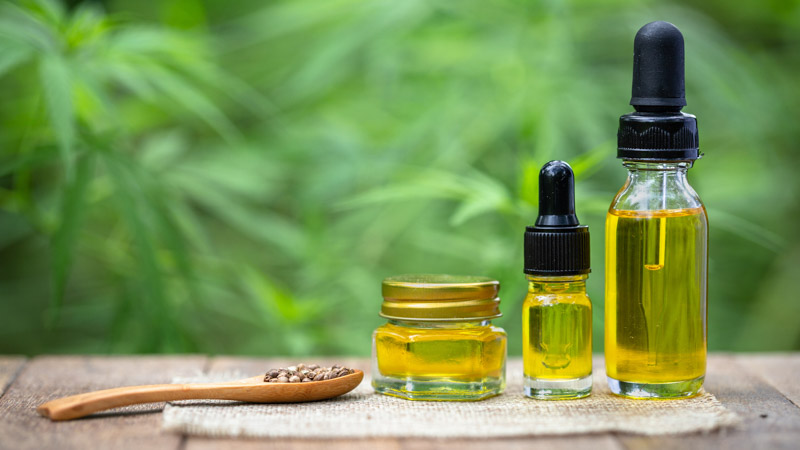
Now that we’ve established the consequences of CBD interactions with other compounds when taken together, it’s time to highlight the common types of drugs that engage with CBD oil. One indication that your medicine may compete with CBD in the liver is if your doctor tells you not to eat grapefruit when you take CBD oil.
See if you can find your medicine in the table below, based on data provided by the School of Medicine at the University of Indiana:
| Class of Drug | Popular Drugs |
| Steroids and corticosteroids | Hydrocortisone, cortisone, prednisone, triamcinolone, dexamethasone |
| HMG CoA reductase inhibitors | Atorvastatin, fluvastatin, lovastatin, pravastatin, pitavastatin, simvastatin, rosuvastatin |
| Calcium channel blockers | Amlodipine, diltiazem, felodipine, isradipine, nicardipine, nifedipine, nisoldipine, verapamil |
| Antihistamines | Brompheniramine, cetirizine, chlorpheniramine, clemastine, diphenhydramine, fexofenadine |
| Prokinetics | Dompeidone, metoclopramide, levosulpiride, renzapride, prucalopride |
| HIV antivirals | Abacavir, didanosine, emtricitabine, lamivudine, stavudine, tenofovir, alafenamide, disoproxil fumarate, zidovudine |
| Immune modulators | Immune globulins, immunosuppressive agents, immunostimulants, bacterial and viral vaccines |
| Benzodiazepines | Alprazolam, clobazam, clonazepam, clorazepate, chlordiazepoxide, diazepam, estazolam, lorazepam |
| Antiarrhythmics | Amiodarone, flecainide, procainamide, propafenone, quinidine, tocainide |
| Antibiotics | Amoxicillin, doxycycline, cephalexin, ciprofloxacin, clindamycin, metronidazole, azithromycin, sulfamethoxazole-trimethoprim, amoxicillin-clavulanate and levofloxacin |
| Anesthetics | Barbiturates, amobarbital, methohexital, thiamylal, etomidate, ketamine, propofol |
| Antipsychotics | Aripiprazole, asenapine, cariprazine, clozapine, lurasidone, olanzapine, quetiapine, risperidone, ziprasidone |
| Antidepressants | Citalopram, escitalopram, fluoxetine, fluvoxamine, paroxetine, sertraline, vortioxetine, vilazodone |
| Anticonvulsants | Acetazolamide, carbamazepine, clobazam, clonazepam, ethosuximide, fosphenytoin, gabapentin, lacosamide, lamotrigine, levetiracetam, methsuximide, nitrazepam, oxcarbazepine, paraldehyde, phenobarbital, phenytoin, primidone, topiramate, valproic acid, vigabatrin, felbamate, tiagabine, hydrochloride, zonisamide |
| Beta blockers | Acebutolol, atenolol, betaxolol, bisoprolol fumarate, carvedilol, esmolol, labetalol, metoprolol, nadolol, nebivolol, penbutolol, propranolol, totalol, timolol |
| Proton-Pump Inhibitors | Omeprazole, lansoprazole, pantoprazole, rabeprazole, esomeprazole, dexlansoprazole |
| Non-Steroidal Anti-Inflammatory Drugs | Aspirin, celecoxib, diclofenac, diflunisal, etodolac, ibuprofen, indomethacin, ketoprofen, ketorolac, nabumetone, naproxen, oxaprozin, piroxicam, salsalate, sulindac, tolmetin |
| Angiotensin II Blockers | Azilsartan, candesartan, eprosartan, irbesartan, losartan, olmesartan, telmisartan, valsartan |
| Oral Hypoglycemic Agents | Sulfonylureas, meglitinides, biguanides, thiazolidinediones, alpha-Glucosidase inhibitors, DPP-4 inhibitors, SGLT2 inhibitors, cycloset |
| Sulfonylureas | Glynase, Micronase, Amaryl, Diabinese, Glucotrol, Tolinase, Tolbutamide |
There’s also another class of drugs known as “prodrugs”. These substances need to be broken down into their therapeutic compounds as opposed to most medications, which are therapeutic compounds themselves. In simple terms, these drugs need to be processed in order to activate their therapeutic compounds.
The inhibitors of the Cytochrome p450 system can result in insufficient concentrations of the active drug compound to be available for the body, leading to the blockage of its therapeutic effect.
Examples of prodrugs: codeine, lisdexamfetamine
Always Talk to Your Doctor if You Think CBD Interactions May Occur
Keep in mind that we’ve just listed the most common drugs that could interact with CBD. The above compilation doesn’t include all of the medications that could cause unwanted interactions when taken alongside CBD oil. Similarly, not all of the aforementioned drugs will result in serious interaction, although if you’re taking one of these medications, we recommend consulting your doctor. A qualified physician should be able to point you in the right direction when it comes to determining possible CBD-drug interactions. Your doctor will also monitor the therapeutic effects as well as adverse reactions resulting from taking CBD with the medications you’re on. In the same way, your doctor can help you adjust the dosages of both the CBD and medication so you can take both compounds together safely.
Key Takeaways on Potential CBD Interactions
CBD is a substance with an established safety profile. It’s well-tolerated and safe to use even at doses as high as 1500 mg daily. That being said, CBD oil can interact with a wide range of pharmaceutical medications due to its profound impact on a variety of systems within the body.
The same mechanisms that allow CBD to be so effective in the management of so many of our daily stressors is also the reason why you should be careful when taking CBD oil with any medication you’re on at that time.
If you want to incorporate CBD into your routine, but you’re afraid of the aforementioned CBD-drug interactions, speak to your doctor for professional advice. Doing so will help you establish the right strategy for your supplementation and avoid the second-hand side effects associated with taking CBD in conjunction with some medications.
